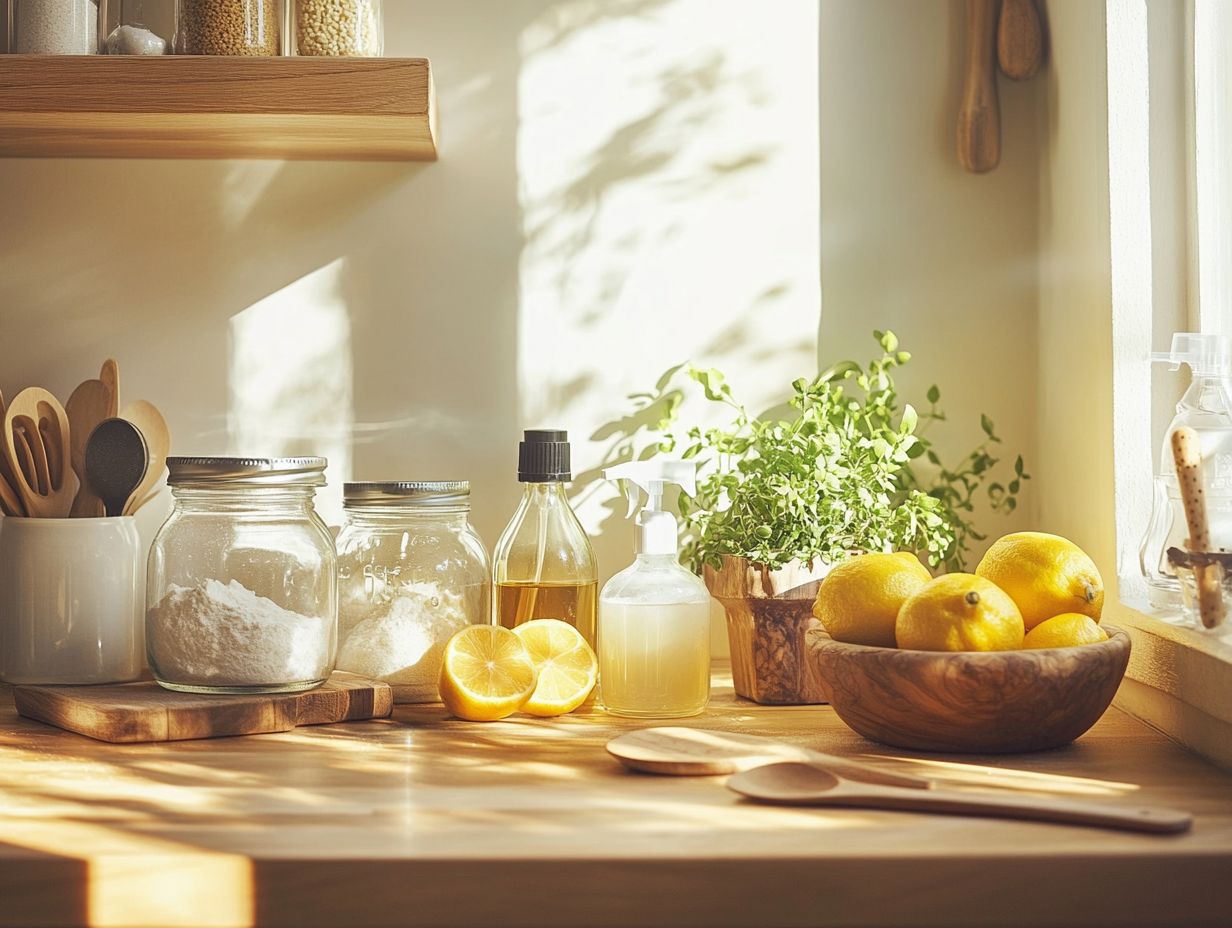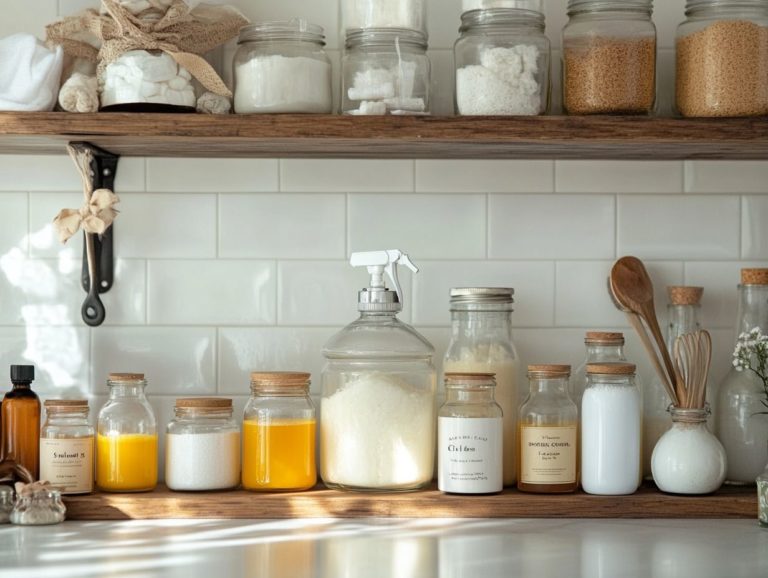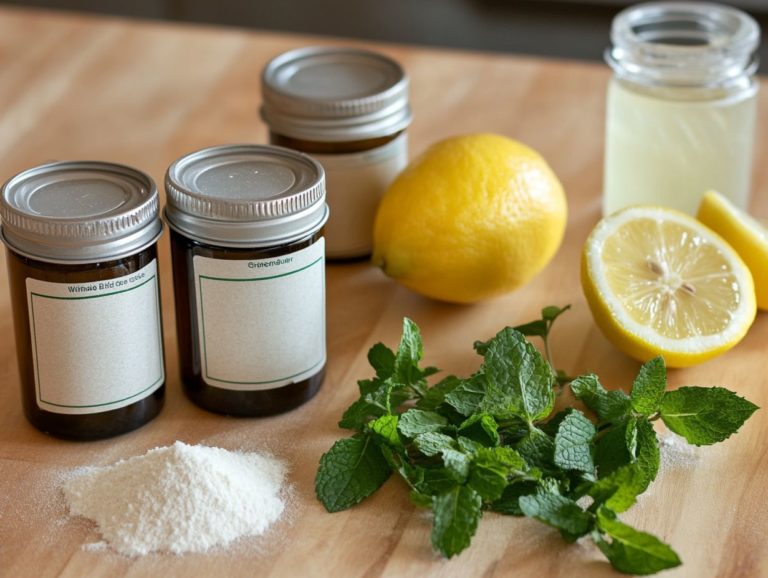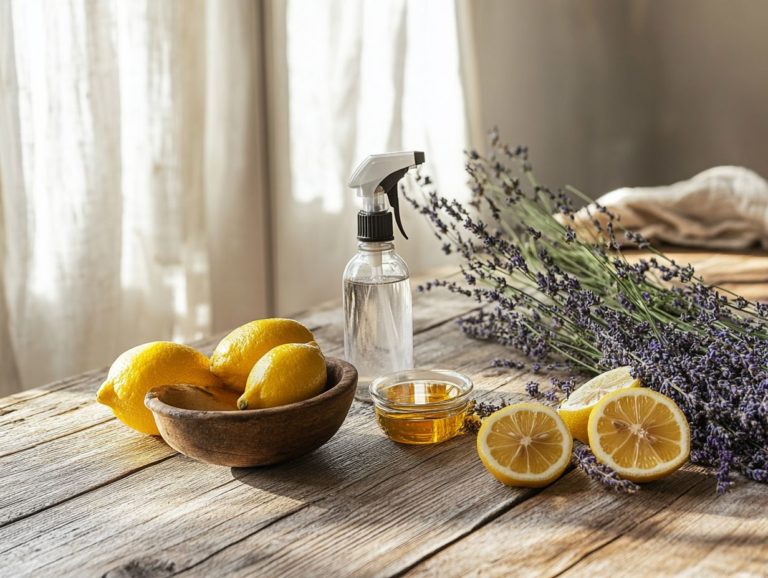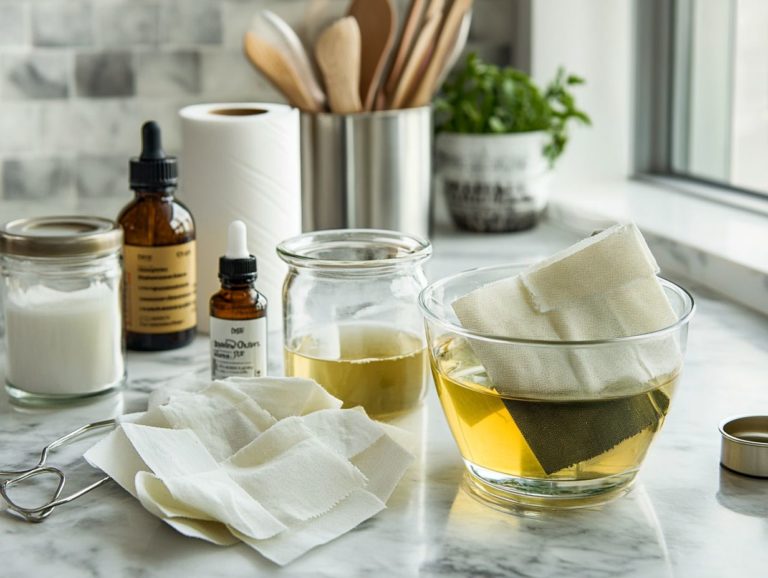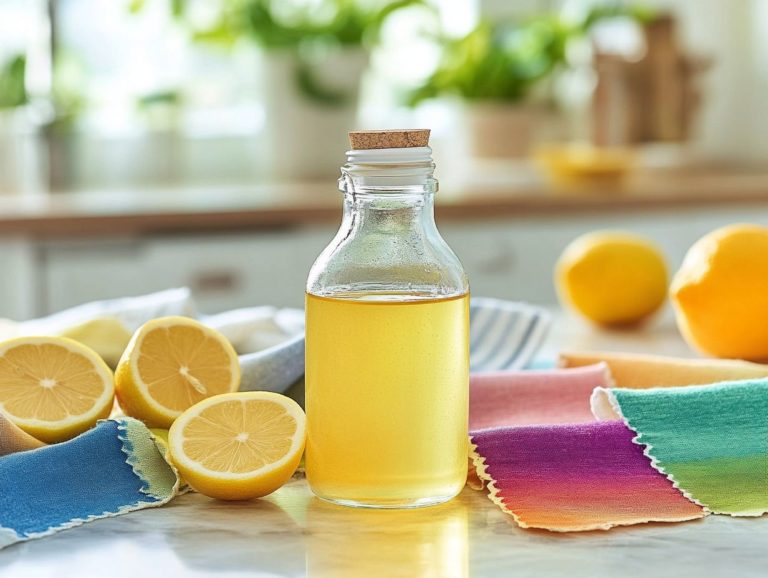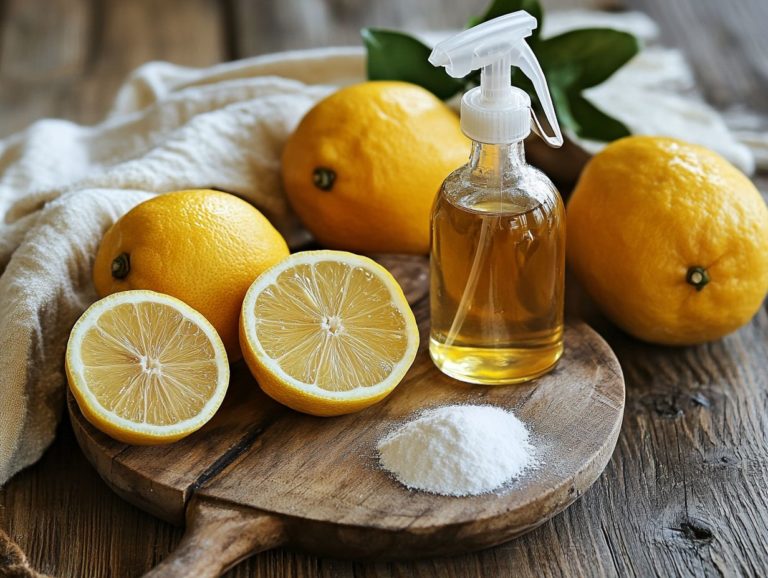5 Simple Steps for Homemade Cleaners
Are you weary of commercial cleaning products packed with harsh chemicals? Make your own homemade cleaners easily and enjoy a healthier home!
This guide will walk you through five simple steps to create your own homemade cleaners. We will cover everything from gathering the necessary ingredients to ensuring proper storage and usage, including effective household surfaces and fabric softener solutions.
Explore the many benefits of DIY cleaners and uncover some popular cleaning recipes. These include natural cleaning and stain remover solutions that will kickstart your journey. Bid farewell to store-bought solutions and embrace an eco-friendly cleaning routine!
Contents
Key Takeaways:
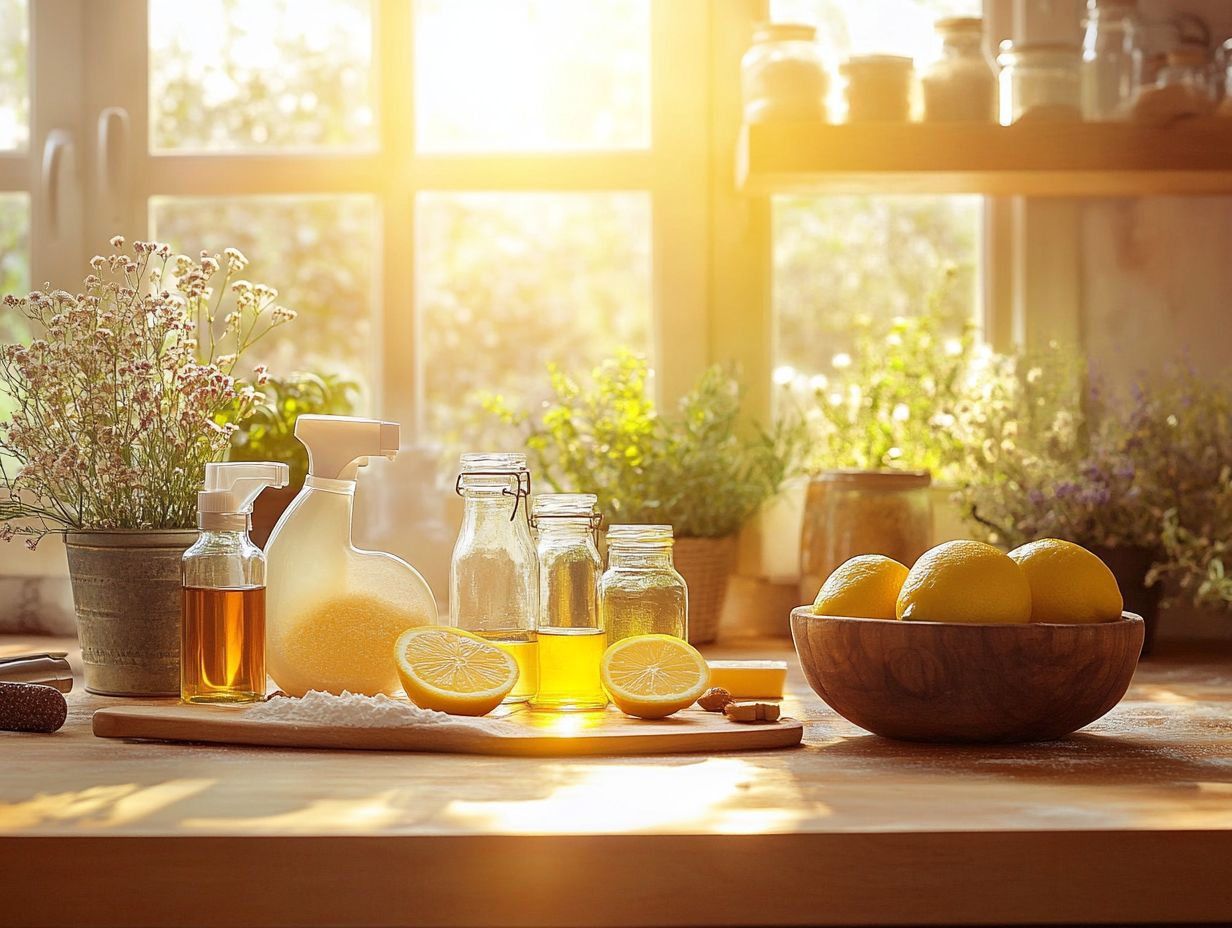
- Making homemade cleaners is easy and cost-effective.
- Label and date your homemade cleaner for safety and organization, ensuring you follow proper safety precautions.
- Homemade cleaners can be made with common and safe ingredients for all surfaces.
1. Gather Necessary Ingredients and Supplies
To create effective homemade cleaners, gather essential ingredients and supplies. These items will enhance cleaning effectiveness and foster a germ-free environment without relying on toxic cleaners.
Think versatile staples like cleaning vinegar, baking soda, essential oils (such as lemon essential oil and lavender essential oil), and Castile soap (a gentle vegetable-based soap) each a powerful ally in your DIY cleaning arsenal.
By using these eco-friendly and budget-friendly household items, you can craft tailored cleaning products that fit your specific needs while being mindful of safety and environmental impact.
Incorporating cleaning vinegar introduces a natural acidity that effectively breaks down grime and disinfects surfaces. Baking soda serves as a gentle abrasive, ideal for tackling tough stains without scratching your surfaces.
Essential oils like eucalyptus essential oil and grapefruit essential oil infuse your space with delightful fragrances while packing antifungal and antibacterial properties to boost your cleaning power.
By choosing these non-toxic alternatives, you protect your family’s health and contribute to a cleaner planet. This allows you to maintain a fresher living environment without compromising safety or environmental integrity.
2. Mix Ingredients in a Spray Bottle or Container
After you ve gathered your ingredients, the next essential step is to mix them efficiently in a spray bottle or container. This will help you craft powerful DIY cleaners tailored to your various cleaning needs.
For an all-purpose cleaner, combine one cup of white vinegar with one cup of water and add 10-15 drops of your favorite essential oil for a refreshing scent. If you re in the mood for a soft scrub, blend one cup of baking soda with a quarter cup of liquid soap, adding vinegar gradually until you reach a delightful paste-like consistency.
This versatile concoction is perfect for tackling stubborn stains on countertops and sinks. For toilet bowl cleaner, mix a quarter cup of baking soda with a cup of vinegar and let it sit for a few minutes before giving it a good scrub.
For window cleaner, combine water with a splash of vinegar for streak-free glass. These homemade solutions deliver robust cleaning power and present a more natural alternative to commercial products. You can maintain a clean environment without the harsh chemicals.
Start making your cleaners today and feel the difference!
3. Label and Date Your Homemade Cleaners
Once your homemade cleaners are expertly mixed and ready for action, it s crucial to label and date each container. Labeling your cleaners keeps them safe and effective.
By clearly noting the ingredients and preparation dates, you enhance product safety and simplify tracking their freshness and potency. This makes it easy to identify which cleaner to use for specific tasks, such as a natural stone cleaner or grease cleaner, eliminating any potential mix-ups that could lead to undesirable consequences.
Store your cleaning solutions in a secure location, out of reach of children and pets. This significantly contributes to a safer home environment and promotes organization by reducing clutter. It also fosters a greater sense of responsibility and awareness regarding the household items you engage with daily.
4. Use and Store Properly
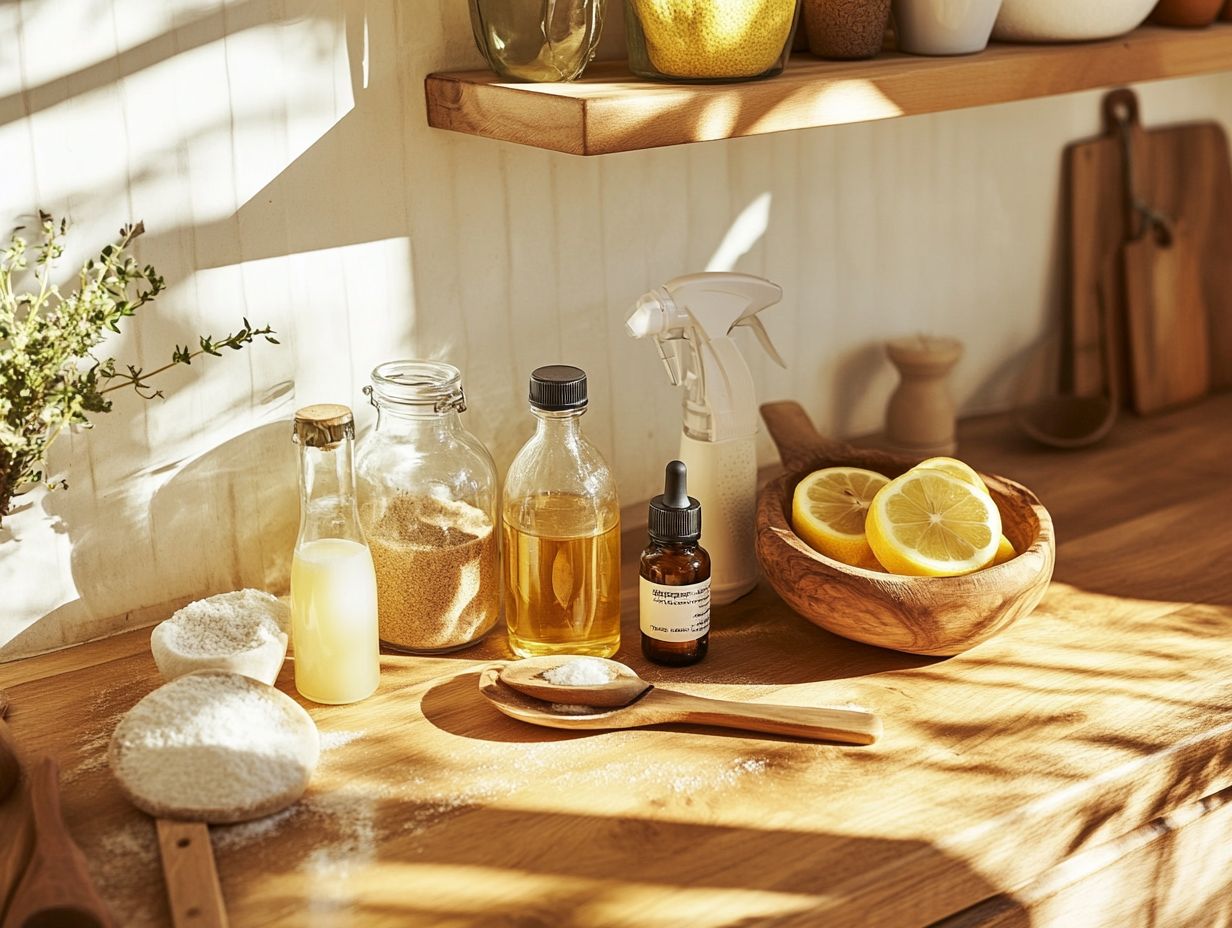
To maximize the effectiveness of your homemade cleaners and maintain a truly germ-free environment, it s exciting to learn how to use your cleaners effectively! This approach prevents contamination and ensures longevity.
By familiarizing yourself with the right dilution ratios the amount of cleaner you mix with water you can fully harness the power of these natural solutions. For general cleaning tasks, mix one part cleaning vinegar with three parts water. When facing tough stains, a paste made from baking soda and water works wonders. Plus, disinfectant wipes made from vinegar and essential oils are perfect for quick clean-ups.
Store these homemade concoctions in cool, dark places. Light and heat can reduce the effectiveness of your cleaners over time and may trigger unwanted chemical reactions. This stands in stark contrast to many commercial cleaners that often contain toxic ingredients posing significant health risks.
Opting for homemade alternatives not only provides a safer choice but is also a more environmentally friendly option.
5. Dispose of Unused Cleaners Safely
Disposing of unused or expired homemade cleaners safely is essential for protecting the environment and adhering to safety precautions. This effectively prevents potential hazards stemming from improper disposal.
When managing those cluttered bottles of cleaning solutions, consult your local waste management guidelines first, as they can differ significantly by area. Many regions provide specific instructions for handling household hazardous waste, including recommendations for safe drop-off locations. Embracing eco-friendly disposal alternatives can significantly lessen your environmental impact.
Act now! Pouring cleaners down the drain can harm our water sources and endanger aquatic life. Instead, consider solidifying the cleaners with an absorbent material and disposing of them in the trash, or participating in local hazardous waste collection events. These responsible options ensure safer outcomes for both your community and the environment.
Why Should You Make Your Own Cleaners?
Creating your own cleaners presents a wealth of benefits. You can save money and use non-toxic ingredients, allowing you to maintain a pristine home while safeguarding your family’s health.
With homemade cleaners, you control the ingredients. This enables you to tailor your solutions to address specific cleaning challenges without relying on harsh chemicals.
This eco-friendly approach not only fosters a safer living space but also aligns seamlessly with your budget-friendly practices, by using everyday household items.
By choosing homemade alternatives, you can significantly decrease your exposure to potentially harmful substances that are often present in mass-produced cleaners. This choice helps reduce risks associated with breathing problems and allergies while cultivating a healthier indoor environment for both children and pets.
Whipping up these cleaners typically requires just a handful of simple ingredients think vinegar, baking soda, and essential oils that are usually at your fingertips and incredibly versatile.
You’re not just saving money; you’re also making a responsible commitment to sustainability. By reducing plastic waste and minimizing chemical runoff, you re doing your part to protect our waterways and wildlife.
What Are the Benefits of Using Homemade Cleaners?
Homemade cleaners come with amazing benefits that you’ll love! These include enhanced health safety through non-toxic ingredients, superior cleaning effectiveness, and the unique ability to customize DIY solutions to meet your specific cleaning needs. For instance, home care expert Carolyn Fort from the Good Housekeeping cleaning lab advocates for using simple ingredients like Kool-Aid as a toilet bowl cleaner and cornstarch for window cleaning.
These cleaners not only minimize your exposure to the harsh chemicals often found in commercial products, but they also elevate your cleaning experience with the addition of essential oils. By incorporating these natural oils, you can indulge in delightful fragrances while harnessing their antimicrobial properties, effectively battling germs without compromising the quality of the air in your home.
Choosing DIY alternatives not only supports your personal wellness but also champions environmental sustainability by cutting down on plastic waste and reducing the carbon footprint linked to mass-produced cleaners. This thoughtful approach fosters a healthier home environment, ultimately benefiting both you and the world around you.
What Are Some Common Ingredients Used in Homemade Cleaners?
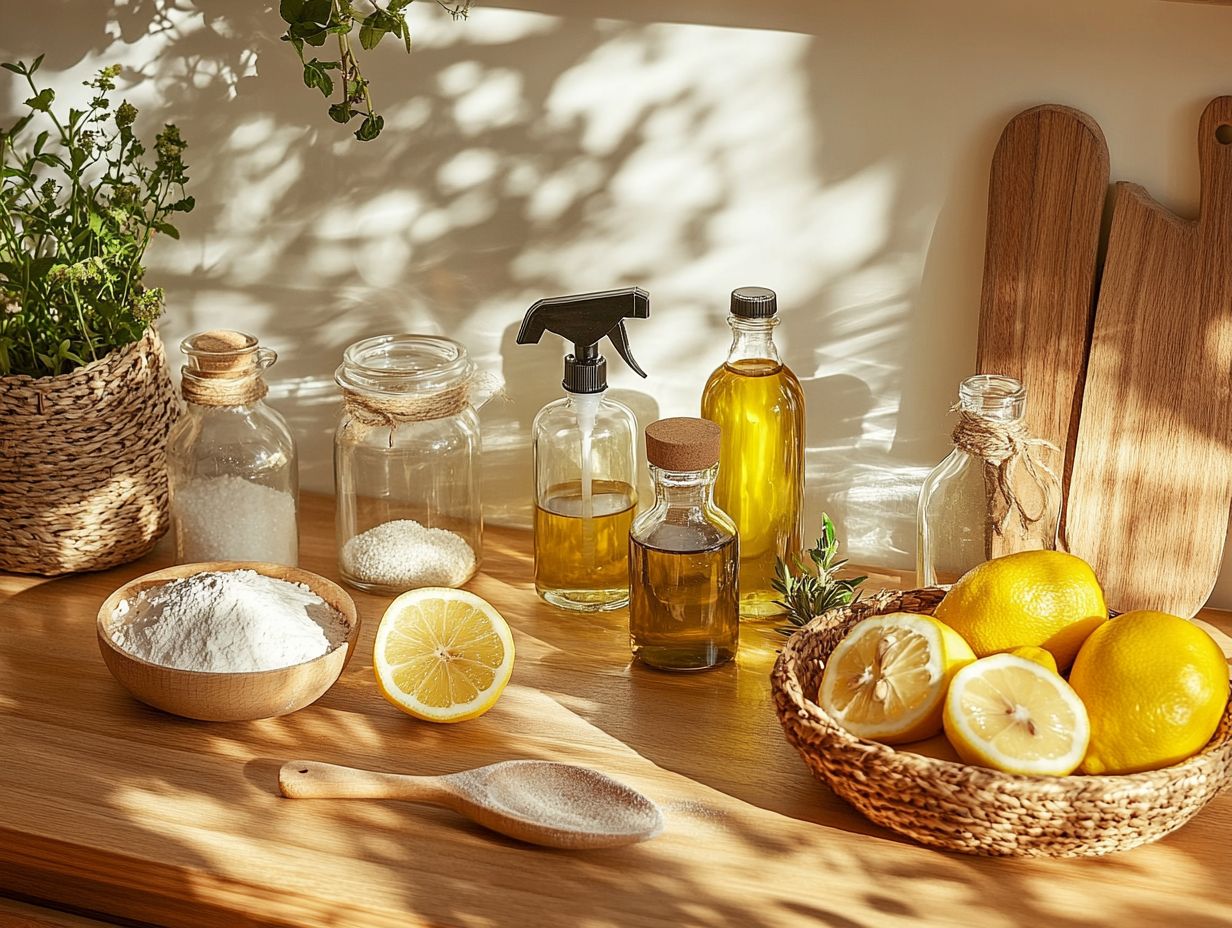
Embrace the power of homemade cleaners by incorporating common ingredients that work wonders on various surfaces. Consider versatile options like:
- Cleaning vinegar
- Baking soda
- Castile soap
- An array of essential oils
Each of these ingredients brings unique cleaning properties to the table, ensuring effectiveness tailored to your needs.
Not only do these natural alternatives offer a more eco-friendly option compared to commercial products, but they also provide exceptional flexibility for tackling a range of cleaning challenges around your home. Take cleaning vinegar, for instance; it s well-known for its ability to dissolve mineral deposits and cut through grease, making it perfect for your kitchen surfaces and appliances. Another powerful grease cleaner is a mixture of white vinegar and dish soap, which can tackle stubborn grime effectively.
Baking soda serves as a gentle abrasive, ideal for scrubbing while neutralizing odors, truly making it a household essential. Then there’s Castile soap, derived from plant oils, which acts as an excellent cleaner that lifts dirt and grime without resorting to harsh chemicals. And let s not forget about essential oils like tea tree or lavender, which not only impart a delightful fragrance but also infuse antibacterial properties into your cleaning routine.
By combining these ingredients, you can easily create tailored solutions for any cleaning task, ranging from window cleaning to bathroom disinfecting, elevating your cleaning prowess while promoting a healthier living environment. For instance, a DIY window cleaner can be made from equal parts vinegar and water, and a toilet bowl cleaner using baking soda and vinegar can keep your bathroom fragrant and germ-free.
Are Homemade Cleaners Safe for All Surfaces?
Homemade cleaners can be a safe and effective choice for many surfaces. However, it s essential to understand the specific requirements of different materials. For instance, natural stone and delicate fabrics demand a bit more attention to avoid any potential damage. A natural stone cleaner can be formulated using mild dish soap and water to prevent discoloration and damage.
Consider hardwood floors; they typically require a gentler solution, such as a mix of water and a few drops of Castile soap. On the other hand, laminate surfaces are more resilient and can handle a bit of scrubbing. To ensure that your homemade cleaner is safe to use, always conduct a test on an inconspicuous area first think of a corner or a hidden section of the surface. If the cleaner doesn t lead to discoloration or damage after a short period, you can feel confident using it on the entire area.
Effective recipes might include a simple vinegar and water solution for countertops or a baking soda paste for tackling tougher stains in the kitchen. A diluted Castile soap mix works wonders in the bathroom, keeping your tiles and fixtures sparkling clean. For those stubborn bathroom stains, a soft scrub made from baking soda and a bit of lemon essential oil can be highly effective.
How Can Homemade Cleaners Save Money?
Homemade cleaners can drastically cut your cleaning costs by harnessing budget-friendly household ingredients and crafting versatile solutions tailored to various cleaning tasks. These cleaning solutions often utilize non-toxic ingredients, making them safer for your home and the environment.
Make your own cleaners! You ll save money by buying ingredients like vinegar, baking soda, and essential oils in bulk. This smart approach not only slashes your expenses but also reduces waste, making your cleaning routine more eco-friendly. Reusing containers from previously purchased commercial products adds to your savings and champions sustainability.
Incorporating household ingredients like cornstarch or hydrogen peroxide can enhance the cleaning effectiveness of your homemade products. These homemade alternatives often serve multiple functions, allowing you to forgo the need for a slew of specialized commercial products. For example, you can whip up a simple all-purpose cleaner using equal parts water and vinegar. A baking soda paste works wonders on those stubborn stains.
Brighten your home instantly with a DIY air freshener made from simple ingredients! Not only does this strategy help you save money, but it also fosters a healthier home environment. Don t miss out on the chance to create your own natural cleaners today!
What Are Some Common Recipes for Homemade Cleaners?
You ll find a wealth of common recipes for homemade cleaners that use simple ingredients like vinegar, baking soda, essential oils, and Castile soap. These recipes provide effective solutions for all your cleaning needs around the house, often without harsh chemicals, making them a safer alternative to traditional cleaning products.
These DIY cleaners not only reduce your exposure to harsh chemicals but also offer an eco-friendly alternative that you can customize to match your specific scents and preferences. For instance, whip up an all-purpose cleaner by mixing one part vinegar with one part water, then adding a few drops of your favorite essential oils for a delightful fragrance. For those who love fruity scents, adding grapefruit essential oil can be a refreshing choice. You can find more insights and recipes in the 5 most effective homemade cleaning recipes.
When faced with tougher messes, consider crafting a soft scrub from baking soda and a splash of Castile soap. If your toilet needs a refresh, combine baking soda and vinegar for a bubbly and powerful cleaner. For sparkling windows, a simple mixture of equal parts vinegar and water will leave you with streak-free surfaces. For extra shine, a few drops of lemon essential oil can be added to your window cleaner mix.
The beauty of these recipes lies in their flexibility, inviting you to experiment with various essential oils and transforming your standard cleaning routine into a fragrant, enjoyable experience. You can use lavender essential oil for a calming effect, eucalyptus for its refreshing scent, or grapefruit for a citrusy burst of freshness. These essential oils benefits go beyond fragrance, as many have inherent cleaning and disinfecting properties.
Frequently Asked Questions
What are 5 simple steps for making homemade cleaners?
The 5 simple steps for making homemade cleaners are as follows: gather ingredients, mix ingredients together, transfer to desired container, label the cleaner, and use as needed. Safety precautions should include wearing gloves and ensuring good ventilation while mixing and using cleaners.
What ingredients do I need for homemade cleaners?
The ingredients needed for homemade cleaners may vary depending on the specific cleaner being made, but some common ingredients include vinegar, baking soda, essential oils, and water. Other useful ingredients can include hydrogen peroxide, rubbing alcohol, and cornstarch for specific cleaning needs.
Are homemade cleaners safe to use?
Yes, homemade cleaners can be safe to use as long as the ingredients are properly measured and mixed together. However, it is always recommended to wear gloves and use proper ventilation when using any type of cleaner. Following these cleaning tips ensures not only safety but also the effectiveness of your homemade cleaning solutions.
Can I use homemade cleaners on all surfaces?
No, it is important to check which surfaces a homemade cleaner is safe to use on before using it. Some cleaners may be too harsh for certain surfaces and could cause damage. For example, natural stone surfaces can be damaged by acidic cleaners like vinegar, so always ensure the compatibility of the cleaner with the surface.
How long do homemade cleaners last?
The shelf life of homemade cleaners can vary depending on the ingredients used. It is best to check the expiration dates on individual ingredients and label the cleaner with an expiration date based on the shortest shelf life ingredient. For instance, a mixture containing water and essential oils might need to be used within a few weeks to ensure its effectiveness.
Are homemade cleaners cost-effective?
Yes, homemade cleaners can be more cost-effective than store-bought cleaners as they often use simple and inexpensive ingredients. Plus, making your own cleaners also reduces the amount of plastic waste from store-bought cleaning products. Budget-friendly and eco-friendly, these DIY cleaners are beneficial for both your wallet and the environment.

